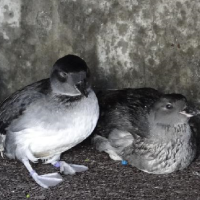Dead and Dying Seabirds Washing Up along West Coast
 Cassin’s Auklets
Cassin’s Auklets
Thousands of small dead and dying seabirds are washing up onshore from Northern California to Washington State and scientists don’t know why. But, as is the case with many stories that begin with some freakish environmental die-off, global warming is among the suspects.
Cassin's auklets have been dying en masse since November, most strikingly in Northern Oregon. In California, they’ve shown up from the Point Reyes/Sonoma Coast area to San Luis Obispo. Scientists have not identified any disease or toxic exposure, although testing continues.
Doug Cordell, a spokesman for the U.S. Fish and Wildlife Service, told the Santa Rosa Press Democrat, “This is believed to be a starvation event.” But, so far, whatever is killing the birds isn’t wreaking more widespread havoc
“We’re seeing a spike of (deaths in) one species that’s giving us clues, and the clues don’t suggest that the bottom is dropping out of the ecosystem,” Julia K. Parrish, Aquatic and Fishery Sciences professor at the University of Washington, told the newspaper. . The gray, stocky, short-billed birds feed, flock and nest in colonies from Mexico to Alaska. They generally live far out in the open ocean, feeding mostly on tiny krill.
Some scientists speculated that the birds might be the victims of their own good fortune. Cassin’s auklets had a very successful breeding season, turning out a lot of birds inexperienced with the rigors of sea. They have had a lot of breeding success the last few years, even producing an unusual second brood (although that didn’t happen this year).
But it could just as easily have to do with the warming oceans.
Mean surface temperatures during July and August in Farallon National Wildlife Refuge, a breeding ground for the birds west of San Francisco, were the second highest in 45 years and far warmer in September. The water temperature at the Farallon Islands was 65 in October, about five degrees warmer than normal. Warmer water could affect food supplies, ocean conditions, wind patterns and weather.
But so far, scientists aren’t seeing an effect on other creatures that a broad ecosystem change might generate. That doesn’t mean something bad isn’t coming. Seabirds like Cassin’s auklets are like canaries in the mineshaft, leading indicators of environmental change. They are at the end of the food chain and early indicators are their food source may be in danger.
The Gulf of Farallones sanctuary is a hotbed of diversity and the destination for long-distance migrating sea creatures, from turtles to sharks. At the base of the feeding chain is krill, or zooplankton. Whales love ‘em, and blue whales can eat 4 tons a day. Prevailing winds whip up the oceans in a manner that pushes the krill and colder water up from the depths to the surface, where a feast can be had by all.
Usually. But not so much lately. Researchers have called this year’s upwelling uninspiring. “If the wind doesn't blow, there's no cooling of the water,” Nate Mantua, a research scientist with the National Marine Fisheries Service in Santa Cruz, told the San Jose Mercury News. "It's like the refrigerator fails. The local water warms up from the sun, and is not cooling off.”
If it turns out that Cassin’s auklets are dying from the loss of their food source, “They would be the first seabird species hit hard by a lack of krill,” according to the Farallones Marine Sanctuary Association.
-Ken Broder
To Learn More:
Large-Scale Die-Off of Small Seabird along Sonoma Coast (by Mary Callahan, Santa Rosa Press Democrat)
High Ocean Temperatures Endangering Seabirds? (by Lisa Krieger, San Jose Mercury News)
Why Is the Beach Covered in Dead Birds? (by Tracy Loew, Salem Statesman Journal)
Bird Carcasses Along Pacific Shore Baffle Biologists (by Javier Panzar, Los Angeles Times)
Unusual Warm Ocean Conditions off California, West Coast Bringing Odd Species (by Paul Rogers, San Jose Mercury News)
In an Unusual Year for Upwelling, Research Cruise Keeps an Eye on Marine Sanctuaries’ Rich Life (by Jason Jaacks, Bay Nature)
- Top Stories
- Unusual News
- Where is the Money Going?
- Controversies
- U.S. and the World
- Appointments and Resignations
- Latest News
- Trump to Stop Deportations If…
- Trump Denounces World Series
- What If China Invaded the United States?
- Donald Trump Has a Mental Health Problem and It Has a Name
- Trump Goes on Renaming Frenzy






Comments